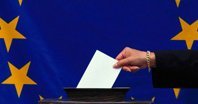All together, the global economic crisis has learned us all that a monolithic and national approach to problems is redundant, even dangerous and that intergovernmental remedies and effective watchdog institutions and transparent directives are most needed in our times.
A coordinated effort to bring the European election campaign into the home of the citizen through the use of smart, congruent and interactive audiovisual media should be given more serious consideration.
The rules of marketing dictate that a commercial channel needs to profit substantially from a costly and long-running programme like a series on European affairs, making it a basic premise to attract a high ‘viewer participation rate’ who will stay hooked on the same channel long enough, while intermittent commercials are targeted at the viewing consumers.
Sapere aude. Stimulating Proactive Assessment amongst Spectators and Readers Liberals will likely disagree with my intention to ‘popularize’ the European elections and state that it’s the voters’ own responsibility to retrieve and assess information, using their common sense. And that’s how the majority of persons, either holding public office or being (self-)employed, will put it: the decision to either contribute or stymie the European parliamentary elections is entirely a personal matter.
I beg to differ, as information on the elections does not pour down to those social layers of the electorate that do not have immediate internet access, including the people that are hardly acquainted with scrutinizing the origin of research data and making unbiased, coherent policy analysis. Also, politics is increasingly infested by demagogy, populist one-liners and mud-throwing contests that discredit the reliability and reputations of politicians.
Expert opinions, from independent sources and nonpartisan NGO’s, should be allowed more time and presence in an open and honest debate, that would be televised or broadcast on the web.
The elder audience that relies on what they read in the newspapers generally (and I’ll hope they’ll forgive me for blaming me) are on average not as critical as one would expect. I will refrain from arguing that this has anything to do with their prior level of education. Because even very internet-savvy people can be easily influenced by misinformation, incomplete information and wrongful representation of information. Statistics may prove all but the truth, warned Benjamin Disraeli. A lot of inconsistencies, inaccuracies and ‘context-blindness’ affect these internet fora. I repeat myself (but sometimes that works according to advertising businesses), when I state that there is too much misrepresentation, decontextualization and falsehood behind certain stated facts.
People on average do not tend to personally verify certain bits of information in popular media, and are prone not to doubt statements of the persons they have the most confidence in. I’ve warned for the ‘sleeper effect’, which I mentioned as an example in my previous piece. Expert opinions, from independent sources and nonpartisan NGO’s, should be allowed more time and presence in an open and honest debate, that would be televised or broadcast on the web.
There is too much misrepresentation, decontextualization and falsehood behind certain stated facts.
The main categorical error that is made, is that politics is reduced to perception and opinions. That statement is seriously flawed. Someone ought to able to distinguish demagogue statements from sound, rational political reasoning. What we ought to do is: focus on previous accomplishments, empirically discern the current facts and shortcomings, and ask European delegates to concretely illustrate policy predictions with figures or graphs and demand verifiable arguments that back their strategies and advocated solutions.
To differentiate amongst overlapping projected policy objectives (what makes the overview of the voter only more obscured), MEP’s should convey rock-hard and to-the-point motivations that support the aims written in the ‘general manifesto contexts’ (who rarely contain concrete plans on taxes, VATs or indicate goals that are earmarked or quantified with percentages).
The Scary Entrapment of Distorting Mindsets Citizen-driven internet fora debating the party programmes are limited and unfortunately hardly representative as they involve barriers concerning knowledge about data interpretation, the internet and used language, level of interest and commitment, and age. These ‘bloggers’ cover only a small portion of the European citizens and consist mostly of higher educated people, not all of them could neither be considered being the ‘best informed’.
One would quite suspect that only people of the judicial branch, unbiased researchers and well-educated political analysts are more aware, and remain vigilantly conscious of the traps that are inherent in the bias of any demagogue. There is still much work to be done to learn the general population how to uncover verifiable results and discover false or incomplete statements by themselves, autonomously. I cannot help but think of people like H.W. Hegel and Immanuel Kant – whose philosophies I take as evident benchmarks for sound human active criticism.
You may call me ‘that idiot who is wasting time on verifying statements on their veracity’. I’ll just take that as a compliment. Because at least, I fight against the entrapment of preconceived mindsets that operate as a filter distorting the veracity and completeness of political analysis. Even when I suppose there is no filter limiting or altering my political conscience, I wish to remain vigilant for any sort of disinformation. Because disinformation is addicting, especially when it tends to feed your previous ‘gut feeling’. It’s the self-fulfilling promise you all too easily think to be ‘laudably proven’. A comparative, maybe dialectic approach to what is being said in the media, is one way to find out. It simply requires more time and effort. But we wouldn’t mind you being spin-doctored and deluded by all those demagogues out there, now would we?


Follow the comments: |
|
